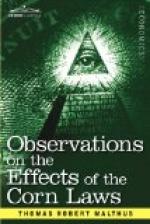If we were to attempt to pursue the same system in a very different state of the country, by raising the importation prices and the bounty in proportion to the fall in the value of money, the effects of the measure might bear very little resemblance to those which took place before. Since 1740 Great Britain has added nearly four millions and a half to her population, and with the addition of Ireland probably eight millions, a greater proportion I believe than in any other country in Europe; and from the structure of our society and the great increase of the middle classes, the demands for the products of pasture have probably been augmented in a still greater proportion. Under these circumstances it is scarcely conceivable that any effects could make us again export corn to the same comparative extent as in the middle of the last century. An increase of the bounty in proportion to the fall in the value of money, would certainly not be sufficient; and probably nothing could accomplish it but such an excessive premium upon exportation, as would at once stop the progress of the population and foreign commerce of the country, in order to let the produce of corn get before it.
In the present state of things then we must necessarily give up the idea of creating a large average surplus. And yet very high duties upon importation, operating alone, are peculiarly liable to occasion great fluctuations of price. It has been already stated, that after they have succeeded in producing an independent supply by steady high prices, an abundant crop which cannot be relieved by exportation, must occasion a very sudden fall.(4*) Should this continue a second or third year, it would unquestionably discourage cultivation, and the country would again become partially dependent. The necessity of importing foreign corn would of course again raise the price of importation, and the same causes might make a similar fall and a subsequent rise recur; and thus prices would tend to vibrate between the high prices occasioned by the high duties on importation and the low prices occasioned by a glut which could not be relieved by exportation.
It is under these difficulties that the parliament is called upon to legislate. On account of the deliberation which the subject naturally requires, but more particularly on account of the present uncertain state of the currency, it would be desirable to delay any final regulation. Should it however be determined to proceed immediately to a revision of the present laws, in order to render them more efficacious, there would be some obvious advantages, both as a temporary and permanent measure, in giving to the restrictions the form of a constant duty upon foreign corn, not to act as a prohibition, but as a protecting, and at the same time, profitable tax. And with a view to prevent the great fall that might be occasioned by a glut, under the circumstances before adverted to, but not to create an average surplus, the old bounty might be continued, and allowed to operate in the same way as the duty at all times, except in extreme cases.




